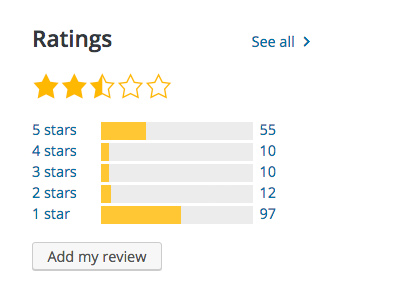Thoughts on Gutenberg

There has been lots of discussion about the new WordPress “Gutenberg” project. Some people love it, some hate it, and most WP users probably have no idea about it. And that’s too bad, because it means many changes will be required for thousands of WordPress plugins and themes. We’re talking about MANY collective work hours to make it happen, even in a best-case rollout scenario.
The debate
Anyone who is in any of the Facebook WordPress groups knows about the debate over Gutenberg. Also on Twitter and other social media channels. For those who may be unfamiliar with the drama, you can get a good idea by browsing through the Plugin Reviews for Gutenberg. Currently, it looks like Gutenberg fans are outnumbered by about 2 to 1:
 Should this plugin be added to the WP core? Do plugin ratings mean anything?
Should this plugin be added to the WP core? Do plugin ratings mean anything?My take
So this post is to ask what your thoughts are, and to share my own opinion, which can be summed up quite succinctly:
Leave Gutenberg as a plugin.
Why? Because there is no real need to add Gutenberg to core. But there are many good reasons for NOT adding to core and leaving Gutenberg as a plugin:
- There are better content-building plugins available
- Lets users decide if a visual content builder is necessary
- Lets users decide which content builder is best for their needs
- Doesn’t break thousands of WordPress sites, plugins, and themes
- Doesn’t push countless hours of needless work onto developers & users
- Enables Gutenberg fans to use the functionality without forcing it on everyone else (win-win)
Basically, Gutenberg should take advantage of WP’s great extensibility and let users decide for themselves. That’s exactly what plugins are for; in fact, thanks to the extensibility of WordPress, users already enjoy a wide variety of incredible content-building plugins. Leaving Gutenberg as a plugin means that everyone wins :)
My advice
IF they absolutely are dead set on forcing Gutenberg into core no matter what the cost, then I recommend the following four golden rules:
- Make Gutenberg optional
- Don’t remove metaboxes
- Don’t remove custom fields
- Don’t remove the plain-text editor
Basically, replace the RTE if you think it needs it; but don’t mess with existing functionality. Waaay too much is built on it. Don’t force more needless work on millions of WordPress developers and users. No feature is worth such massive potential disruption for so many people. Talking high stakes here, folks.
Your thoughts?
What do YOU think about Gutenberg? Do you think it should be added into the WP core, or left as a plugin? Or abandoned altogether in favor of something better? Share your thoughts (but be nice!) in the comments below.
Update
It looks like they’re dead set on forcing Gutenberg into core. They recently sent out a lengthy “4.9 update” email trying to explain and justify their plans, for example:
The first iteration of Gutenberg introduces a new editor design featuring content blocks that can be directly manipulated. Even though the initial version aims to replace only the writing screen, future iterations planned for next year go into page templates and, ultimately, full site customization.
LOL! As if all of that hasn’t been possible for years now, using one of the many great drag-n-drop, content-building plugins. Like installing a plugin is too much to ask of WP users? It takes like what, a few clicks..?
Also..
Despite what the Gutenberg devs and others have been saying, it sounds like they DO plan on removing custom fields, meta boxes, and shortcodes entirely, as suggested by this statement (also from the 4.9-update email):
[Gutenberg is] a big change, and various paths will support existing WordPress functionality (such as shortcodes or meta-boxes) to help their transition.
I don’t know about you, but to me, that sounds like they are saying that shortcodes and meta boxes eventually will be removed. Which is the opposite of what many of us have been told by team Gutenberg. The ol’ bait & switch..
Even more telling is the fact that the 4.9 update email does not link to the Gutenberg plugin page (you know, the one with mostly bad reviews).. instead they link to the new Gutenberg documentation, so it’s all good. You can marvel at the “greatness” of it all:
https://wordpress.org/gutenberg/
As if the entire community is pulling together to make it happen. It feels more like WordPress is being hijacked by a few overzealous developers, for whom 25% market share just isn’t “enough”. Gotta completely reinvent the wheel and “fix” something that works perfectly fine for millions of users.
More to come..
I’ll continue to update this post with more news as it becomes available. Currently it sounds a lot like shenanigans and crafty maneuvering, especially with the apparent back-peddling on promises made regarding meta boxes, custom fields, shortcodes, which thousands upon thousands of WordPress plugins make use of.
And if you think it’s not happening, or won’t affect you, here is another gem from the 4.9 update email:
When will Gutenberg be in core? The plan is to release Gutenberg in WordPress 5.0 early next year, so now is a great time to test and get ready for it.
This ominous warning is then followed by an invitation to help, along with a link to the Gutenberg Github page.
33 responses
-
Amen. I completely agree that there is no good reason to make Gutenberg part of the core, much less mandatory. If it’s going to go into core, there needs to be a way to turn it off, if desired. No doubt a plugin will appear very quickly to do so if that option is not provided in WP.
-
Guess I have been a bit out of the loop – so to speak. Leave it as a plugin is my vote for sure. The thought that the text editor may go away is down right frightening –
-
Let’s go a step further for the pro-Gutenberg crowd:
Make Gutenberg the default Posts editor. Custom post types won’t use Gutenberg unless they declare support. And give us the ability to turn Gutenberg off on posts, too
-
That makes sense. I think Gutenberg is still a good option for users. But for CPT, making it opt-in is the best solution for now.
-
-
I’m having a recipe website, thousands of recipes, all using the custom fields for ingredients and cooking time etc. Are they really planning to remove the custom fields? This will mean that I am not going to update WP any more. If they are going to remove the customs fields, I’d like to know from them how to convert the values to the new system.
-
It kind of looks like that they’re going to leave the metaboxes alone.
“I’ve said repeatedly we are going to account for meta-boxes. The only uncertainty is what is technically viable and how it will be displayed in the new UI.
We are not attempting to break anything—shortcodes, custom fields, etc—all should still work. The UI to interact with them might change (unless you disable Gutenberg completely), and certain use cases for meta-boxes are going to be a better fit for blocks going forwards.”
-
This is the source: https://github.com/WordPress/gutenberg/issues/952
-
-
After an in-my-head cost-benefit comparison, I couldn’t see how the benefits of adding Gutenberg to the core could outway the costs.
So, like you, I’m firmly in the “keep it as a plugin” camp.
And keep it voluntary all the way, to boot! -
This is what I’ve been saying all along – roll Gutenberg into WordPress.com as the default editor and then have it as an option via Jetpack or a standalone plugin for self-hosted installs.
-
Totally agree, they are crazy!
-
Agree one hundred percent.
Just like visual composer and avadas fusion builder and even wpmu dev’s page builder, are all optional.
You can click a button and use the drag and drop interfaces or just use the simple RTE.
I HOPE this is what they choose to do for Gutenberg as well!
-
I’m with you 100%!!
I think Gutenberg should be either a plugin or if a part of WordPress, it *has* to be able to be turned off!
While I personally dislike drag-n-drop editors due to them filling things with shortcodes, codebloat and lock-in to a particular d-n-d editor, I do have a few clients in love with d-n-d. (I’m assuming that Gutenberg is doing its magic with shortcodes as well)
What I can see as an advantage to Gutenburg being part of WP is WordPress effectively mandating a consistent and universal set of Editor Shortcodes for all to use.
I *HATE* the concept of a client being locked into a particular theme or plugin because of proprietary shortcodes!
-
I’m assuming that Gutenberg is doing its magic with shortcodes as well
Not shortcodes but structured HTML comments
-
I’m also all for keeping/making it a plugin. Too bad that Core no longer listens, so that most likely the monstrosity will be added anyway.
As John above says, if Gutenberg lands in WP I am seriously planning on fixing WP’s version to 499.x and be done with it.
I don’t think that a fork is going to happen which means that ultimately (within a year or two after 5.0 drops) I will have to switch over to something else.
I have made a few things already with Grav CMS, which for one is a lot faster than the average WP install and a lot safer too due to the fact there is no database.
We’ll see where this strands, but I’m not keeping my hopes up.
-
Keep it is a plugin, just as Jetpack is a plugin and not in WP core. If in WP 5.0 core, then make it an opt-in. Not install Classic Editor plugin, enable setting and then is it disabled.
-
I’d seriously be interested in contributing to a fork if one is made. As a committed ACF Pro user, the Gutenberg flavour of WordPress has no place in my workflow and I will keep my sites at 4.9.x if I have to.
-
Just make more noise to have the option to turn it off if you want to use a non open-source page builder plugin that you need to pay $ for each year instead of the free open-source option that WordPress will be offering so it continues being the worlds most popular blogging platform for everyone.
-
Totally agree with you Jeff on leaving it as a plugin. The WordPress core team are apparently making Gutenberg part of WordPress providing option to disable it via the classic plugin which should be the reverse.
-
Gutenberg is a critical module yet as concur with you that it cannot be added to Wp Core.because there are numerous modules that are essential as Gutenberg so no compelling reason to add it to centre.
-
I really did not have the idea about Gutenberg Jeff? Can this be disable as plugin?







